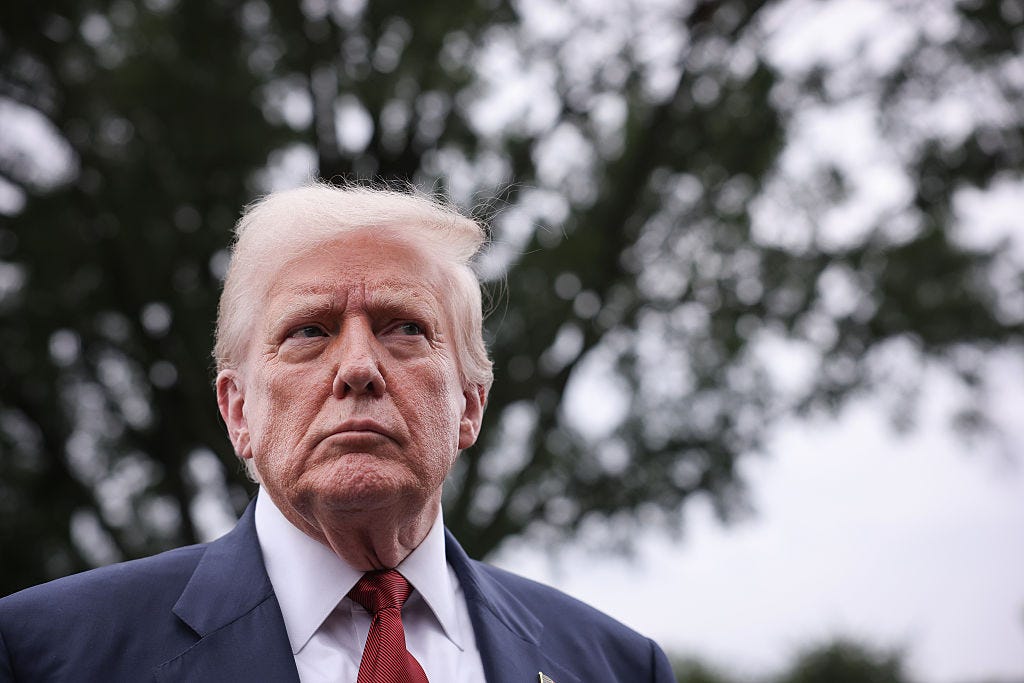The Revenge Presidency
Trump’s campaign against his perceived enemies is just beginning.

This article is brought to you by American Purpose, the magazine and community founded by Francis Fukuyama in 2020, which is proudly part of the Persuasion family.
Before Donald Trump returned to power, many of us who’d worked for him had been sounding the alarm for years. We warned that Trump 2.0 wouldn’t be about governance. It would be about vengeance. We predicted the dismantling of guardrails, the corrosion of norms, and the ruthless expansion of presidential power against Trump’s enemies.
But what’s unfolded in just six months is even more destructive than most envisioned. And it’s been wrapped in Orwellian rhetoric unfamiliar to our democracy, including DOJ “strike forces,” accusations of “seditious conspiracy,” orders on “restoring biological truth to the federal government,” and more.
For instance, Trump has rapidly transformed the Justice Department into a revenge machine, launching investigations into whistleblowers and political opponents while signing executive orders that accuse critics—myself included—of “treason,” a crime punishable by death. His Attorney General Pam Bondi has created a “Weaponization Working Group” to go after the president’s political opponents. And the White House has ensured the Department is purged of prosecutors who were involved in cases that were damaging to Trump or his interests.
But the campaign goes far beyond DOJ.
Across the federal government, Trump’s allies have launched a sweeping effort to “deconstruct the administrative state,” an old refrain now given dangerous new teeth. The Department of Government Efficiency (DOGE) has initiated wholesale agency cuts—starting with offices deemed too progressive or too “globalist” in outlook and expanding to the wholesale cancellation of entire agencies. Meanwhile, an ongoing Reduction in Force (RIF) effort is aimed at culling tens of thousands of civil servants under the guise of “streamlining” government, though the obvious intent has been to jettison programs and people deemed to be out of alignment with administration priorities.
In the intelligence community, the situation is even more alarming. Trump has installed loyalists at the top of agencies designed to deliver the truths the president wants to hear. Director of National Intelligence Tulsi Gabbard has most conspicuously led this charge, emerging this week for a bizarre White House press conference to peddle a conspiracy theory that former president Barack Obama manipulated intelligence in 2016 about Russia to hurt Trump in the election. The president used Gabbard’s claims to accuse his predecessor of “treason.”
Intelligence veterans have told me privately that analysts are now self-censoring out of fear. Assessments that once warned of foreign threats could be scrubbed or softened if they don’t comport with the administration’s worldview. One recent example: the administration fired multiple intelligence officials after they briefed Congress that the Venezuelan gang Tren de Aragua was not a foreign-directed terror threat—contradicting President Trump’s public statements. Trump had claimed, without evidence, that the gang was being “weaponized” by Nicolás Maduro’s regime to destabilize the United States, and insisted on labeling it a national security threat.
The courts have fared no better. Though Trump lacks the power to “get rid of the judges” (something he once expressed a desire to do in an Oval Office meeting), his supporters in Congress have proposed legislation to gerrymander judicial districts, limit court jurisdiction over executive actions, and investigate or impeach judges seen as hostile to the president. At the same time, one recent review found that the Trump administration had already defied a whopping one in three judges who’ve ruled against it.
Meanwhile, the military is being conscripted into domestic politics. Earlier this summer, Trump ordered troop deployments to California for an immigration crackdown that appeared to be a harbinger of the president’s willingness to use force domestically. Fears that the White House might invoke the Insurrection Act for a wider crackdown were compounded by the president’s own social media missives warning “other such Cities [at] the core of the Democrat Power Center.”
What’s more, the Department I used to oversee—the Department of Homeland Security—is well on the path to being politicized beyond recognition. Aside from immigration, nowhere has this been more alarming than the administration’s plan to dismantle FEMA and put the president in charge of deciding who gets aid money after disasters—and who doesn’t. The weaponization of disaster aid is something I’ve warned about for years. In the name of protecting “conservative voices,” DHS has also slashed the nation’s top cybersecurity agency over bogus claims that its efforts to block Russian interference amounted to conservative censorship.
The president’s revenge campaign extends outside of government.
Legal institutions were among the first targets. The administration’s executive orders targeting “big law” have sown chaos in the profession. Even if the courts have struck down those orders, most major firms quietly settled with the White House by signing multi-million dollar deals to support the administration’s policies and causes—in the process displaying fealty to a White House that wants to cow them into submission. Many of these firms have since refused to take on clients with cases against the Trump administration.
Universities have been similarly intimidated. Federal grants have been rescinded from schools that hosted anti-Trump speakers or conducted research on “controversial” topics like racial inequality. Harvard has become ground zero for the crackdown: its tax status challenged, student visas revoked, and staff under investigation. At the University of Virginia, a highly respected president resigned after federal officials threatened funding unless DEI programs were “reevaluated.” Columbia University recently agreed to a $200 million settlement with the administration, bowing to the White House in order to restore its federal funding.
But no institution has been more systematically assailed than the free press.
NPR and PBS have seen their funding gutted by the Trump administration. The president has filed multi-billion-dollar lawsuits against outlets ranging from The Wall Street Journal to CBS in unsubstantiated complaints of biased coverage. The once-independent Voice of America is now staffed by former campaign operatives and serves as a megaphone for administration propaganda. In many briefings, press access is denied entirely to reporters from outlets the White House deems hostile. Others are offered access only in exchange for favorable coverage.
The goal is not just to muzzle dissent. It is to erase it.
The cumulative effect of all this is societal fear. Americans are watching their institutions go silent. Dissent is being driven underground. Journalists are muting their own stories. Educators are canceling lectures. Activists are self-policing their words. The chilling effect is real and intentional.
Our system of government can withstand a lot. But as the Founders warned, it was never designed to withstand a demagogue who commands the levers of power and the loyalty of his party. James Madison feared “factions” might overpower reason. George Washington warned against “the spirit of revenge” in politics. And Thomas Jefferson believed that a well-informed public was the only true defense against tyranny.
Yet the public is being misled as the mob is empowered by a president who has vowed sweeping retribution against so-called elites.
So where do we go from here?
We must learn from abroad. In Hungary, it took more than a decade for Viktor Orbán’s grip to calcify, but it started with a purge of courts and universities. In Turkey, Recep Tayyip Erdoğan used a failed coup as a pretext to arrest journalists and remake the military. In Poland, a grassroots, peaceful protest movement—millions strong—eventually helped reverse democratic backsliding. And in Chile, it was students and teachers who sparked a national awakening.
The common thread in successful reversals? Public courage and peaceful resistance, coupled with relentless truth-telling.
If the past six months have taught us anything, it’s that Trump’s revenge campaign isn’t over; it’s just beginning. And if we don’t meet it head-on, with all the clarity and courage we can muster, America may not look like America much longer.
Miles Taylor served as Chief of Staff of the U.S. Department of Homeland Security in the first Trump administration, is a #1 New York Times best-selling author, and produces the newsletter Treason on Substack.
Follow Persuasion on Twitter, LinkedIn, and YouTube to keep up with our latest articles, podcasts, and events, as well as updates from excellent writers across our network.
And, to receive pieces like this in your inbox and support our work, subscribe below:





Couldn’t agree more. For decades, Washington has been constructing an entrenched bureaucracy rooted in left-wing idealism—one that runs counter to the sensibilities of everyday voters. Trump 1.0 was the inevitable backlash. But instead of respecting the democratic process, the left including the bureaucracy retaliated with unprecedented force. Treasonous collusion? Maybe. Maybe not.
But the underlying message from voters was clear: rein in the government.
Rather than heed that call, Biden doubled down—unleashing a wave of progressive overreach that borders on democratic despotism. The Democrats’ refusal to bend, especially in their selection of candidates, left voters with one option: Trump 2.0.
Is he a bull in a China shop? Absolutely. But for many, watching him dismantle the Washington establishment is emotionally satisfying, if not cathartic.
If Democrats want to remain relevant, they need to stop behaving like ideological zealots and start reaching for the center. That means working across the aisle and being willing to dismantle parts of the bloated federal apparatus. A sensible starting point? Biden’s reckless immigration stance. It’s time to adopt policies that swiftly return illegal entrants to their home countries—without sacrificing the humane aspects of our system.